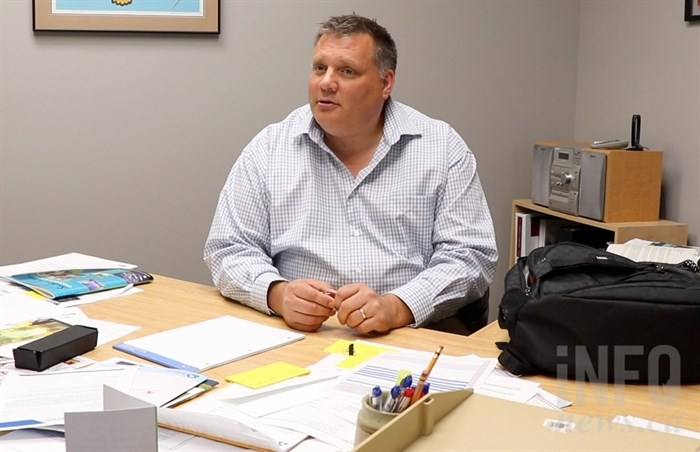
Kamloops-North Thompson MLA Peter Milobar at his Kamloops office.
(SHELBY THEVENOT / iNFOnews.ca)
September 13, 2018 - 6:30 PM
KAMLOOPS - Next month, voters will head to the polls to make a decision on which officials they would like to elect to make up their local government.
You're going to hear all kinds of claims from candidates but what actually makes a good councillor? Exactly what powers do they have and what should you be looking for?
Kamloops-North Thompson MLA Peter Milobar was first a Kamloops city councillor for two terms then mayor for two terms. He says candidates can promise what they want but they have no power at all unless they work as a team.
“Having been both a councillor and a mayor neither one has the ultimate authority to unilaterally do something,” Milobar says. “I get why people say when they are running for office, ‘Elect me, I’m going to do this,’ well in reality in practice, that’s not what happens.”
The primary roles of a local government can be divided into two categories: policy-making and day to day operations, but councillors are only involved in policy and leave operations to professionals who work for the city, led by the Chief Administrative Officer or CAO.
That's essentially the only employee they deal with directly and the only one they can hire or fire directly.
“(Council) can set staffing levels, service levels or say ‘well we want more people working in streets or less people working in streets or more or fewer lifeguards but council cannot fire specific people individually,” Milobar says.
Even when this divide is understood, the power of an individual councillor is also limited. To pass a bylaw or motion among a council of eight councillors and one mayor, five out of nine votes are needed.
“I can understand why people in the campaign say (certain things) but in terms of what can actually happen — there’s nine of you around the council table, everyone has an equal vote, the mayor included,” he says. “You need to be able to listen to people and recognize that what you want to do might take several years to do and maybe you need to do incremental steps each year to get to your final end.”
Milobar says candidates should state what their plans are for when they are elected, but they also shouldn’t mislead the public in their campaign.
“One councillor may really want to downsize and cut city operations down but if you don’t have four other people on the council table to agree with you, it’s just one out of nine opinions and you see this quite often around budget season,” Milobar says. “Often there will be a councillor or the mayor will say they don’t agree that they’re cutting a project or funding a project and vote against it, but the project will still happen or the project gets cut.”
What it comes down to, Milobar says, is councillors finding the best way to work together to make decisions for their municipality as a whole.
“It’s really about trying to figure out how to work as a team,” Milobar says. “Working as a team while still being an individual is really what being a councillor is at its core."
Milobar says in his 15 years in local government, he says the part-time job as an elected official was overall a rewarding experience, but like many jobs, there were lots to learn firsthand — including balancing the role with a full time job.
Municipal elections will take place on Oct. 20.
To contact a reporter for this story, email Karen Edwards or call (250) 819-3723 or email the editor. You can also submit photos, videos or news tips to the newsroom and be entered to win a monthly prize draw.
We welcome your comments and opinions on our stories but play nice. We won't censor or delete comments unless they contain off-topic statements or links, unnecessary vulgarity, false facts, spam or obviously fake profiles. If you have any concerns about what you see in comments, email the editor in the link above.
News from © iNFOnews, 2018